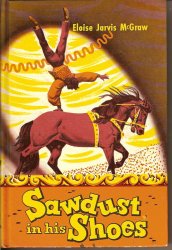
 Sawdust in His Shoes
Sawdust in His ShoesReview posted July 11, 2014.
Coward-McCann, New York, 1950. 246 pages.
Starred Review
I’m on a roll getting Interlibrary loans of books I loved in childhood which are no longer in print. And what a shame this one is not in print! Some other books by Eloise Jarvis McGraw (which I have never read) are in print, but not this one that I checked out over and over again and loved so much!
I actually was reminded of this book about a year ago when I was looking at a site that had craft projects (I think purses) made out of old books. I was scandalized when I saw that this wonderful book had been used in such a way! I looked for it on Amazon, but the only availability was hugely expensive. So then when we were asked to try out the new Interlibrary loan system at our library, I realized this was my opportunity to revisit this childhood favorite.
And I’m happy to report that Sawdust in his Shoes is every bit as wonderful as I remember it being! Yes, there are some old-fashioned bits – most of the families are farmers, and they have a party phone line – but the core of the story about a boy who’s lost everyone he loves and then finds a home, learns about acceptance, learns to trust, and achieves excellence – that story will touch hearts forever.
Joe Lang was born in a circus wagon. His father’s a lion tamer and his mother was a tightrope artist. But after his mother’s death, his father remarried a gillie, a non-circus person, and Joe and his stepmother never did get along. For years, Joe has lived in the wagon of his best friend, Mo Shapely, a clown who trained Joe as an equestrian trick rider.
Joe is on the verge of starring in his own act when tragedy occurs. Mo tries to convince the court that he’s an appropriate guardian for a fifteen-year-old boy, but the wheels of justice turn slowly. Joe is sent to the Pineville Industrial School for Boys. It’s a horrible place, and no one has ever escaped. But Joe tries to reach the circus before they head out to the other side of the country. He ends up injuring himself when trying to jump over a barbed wire fence.
But that injury lands him in the home of a farm family unlike any people he’s ever met before. Joe won’t tell them his last name, since he doesn’t want to get sent back to Pineville, but Pop Dawson takes him on as a farm hand.
The story from there is delightful. All the family members are well-drawn. A lot of the action is shown through the perspective of Henry, three years younger than Joe and lacking in self-confidence. Henry’s sister Ann is talkative and enthusiastic and confident. And then Shelley, the little one, wins Joe’s heart by simply trusting him.
There are some old-fashioned parts of this book. Besides the party line, Pop Dawson smokes a pipe even after heart trouble. Joe gets in a fist fight in Henry’s defense, and all the men of the community cheer him on. For that matter, I’m sure there aren’t so many family farms in Oregon these days.
But the core of the book is timeless. Joe finds a family and learns to trust, but also works to rise to his proper place in the world, doing what he was born to do.
